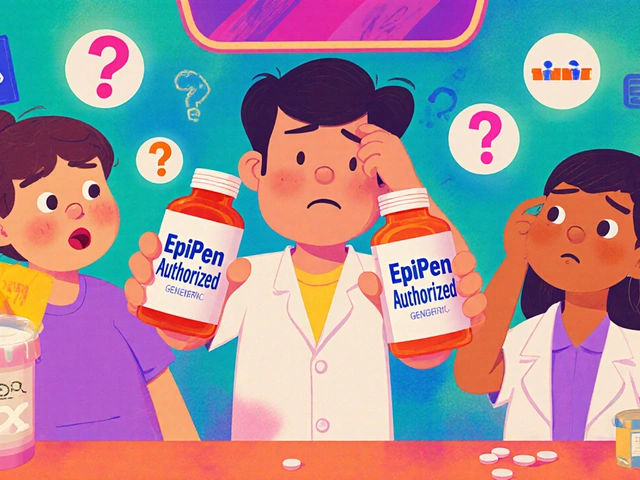Understanding Clinically Isolated Syndrome
Clinically Isolated Syndrome (CIS) is a term used to describe the first neurological episode that a person experiences, which could be indicative of multiple sclerosis (MS). It is characterized by the presence of demyelination, which is the damage to the protective covering of nerve fibers, in the central nervous system. However, not everyone with CIS will go on to develop MS.
In this article, we will explore the connection between CIS and vitamin D levels, and how this information can be used to improve the management of this condition.
The Role of Vitamin D in the Immune System
Vitamin D is a fat-soluble vitamin that plays a crucial role in maintaining the health of our bones, teeth, and immune system. It is primarily obtained through exposure to sunlight, but can also be found in certain foods and supplements.
Research has shown that vitamin D is important for the proper functioning of the immune system, as it helps to regulate the production and activity of immune cells. This is particularly relevant in the context of autoimmune diseases like MS, where the immune system mistakenly attacks the body's own tissues.
Low Vitamin D Levels and Clinically Isolated Syndrome
Several studies have found a link between low vitamin D levels and an increased risk of developing CIS. This suggests that having insufficient vitamin D in the body may contribute to the development of this condition.
It has also been observed that people with lower vitamin D levels are more likely to experience a second neurological event, which could lead to a diagnosis of MS. This highlights the importance of maintaining adequate vitamin D levels for individuals who have experienced CIS.
Why Vitamin D Deficiency is Common in CIS Patients
There are several reasons why people with CIS may have low vitamin D levels. First, a lack of sunlight exposure is a common cause of vitamin D deficiency, especially in people who live in regions with less sunlight or who spend most of their time indoors.
Additionally, certain genetic factors can influence an individual's ability to produce and metabolize vitamin D, making it more difficult for them to maintain adequate levels. Finally, some medications used to manage symptoms of CIS and MS can also interfere with vitamin D metabolism, further contributing to deficiency.
Impact of Vitamin D Supplementation on CIS Outcomes
Given the link between low vitamin D levels and CIS, it is reasonable to consider whether supplementation could have a positive impact on the outcomes of people with this condition. Several studies have investigated this possibility, with promising results.
Research has shown that vitamin D supplementation may help to reduce the risk of a second neurological event, potentially delaying or even preventing the onset of MS. Furthermore, it has been suggested that vitamin D supplementation could improve overall neurological function and quality of life in individuals with CIS.
Recommended Vitamin D Intake for CIS Patients
It is important for people with CIS to maintain adequate vitamin D levels in order to support their immune system and potentially reduce the risk of developing MS. The recommended daily intake of vitamin D varies depending on factors such as age, sex, and life stage.
However, some experts suggest that individuals with CIS may benefit from higher levels of supplementation, in order to achieve optimal blood concentrations of the vitamin. It is always best to consult with a healthcare professional to determine the appropriate dosage for your specific situation.
The Role of Lifestyle Factors in Managing CIS
While vitamin D supplementation can be an important part of managing CIS, it is also crucial to consider other lifestyle factors that can impact the course of the condition. For example, regular exercise, a balanced diet, and stress reduction techniques can all contribute to overall health and well-being.
In particular, a diet rich in anti-inflammatory foods, such as fruits, vegetables, and healthy fats, can help to support the immune system and may be beneficial for individuals with CIS. Additionally, quitting smoking and limiting alcohol consumption can further reduce the risk of developing MS.
Conclusion: The Importance of a Comprehensive Approach to CIS Management
In conclusion, there is a clear connection between vitamin D levels and the development and progression of Clinically Isolated Syndrome. Ensuring adequate vitamin D intake, through sunlight exposure, diet, and supplementation, is an important aspect of managing this condition.
However, it is also essential to adopt a comprehensive approach to CIS management, which includes addressing other lifestyle factors that can impact the immune system and overall health. By doing so, individuals with CIS can improve their chances of delaying or preventing the onset of multiple sclerosis and maintaining a high quality of life.







17 Comments
One must, undoubtedly, recognize the sheer myopia inherent in reductively attributing the multifaceted pathology of Clinically Isolated Syndrome to a singular micronutrient; indeed, the reductionist zeal displayed herein borders on the academically negligent, as if vitamin D were a panacea bestowed upon us by the very sun itself-such simplification, while convenient, betrays a profound misunderstanding of immunological nuance.
While I appreciate the effort to synthesize the literature, it is essential to maintain a clear demarcation between correlation and causation; the data suggest a trend, yet they do not definitively establish that supplementation alone alters disease trajectory. In practice, a balanced approach-considering environmental, genetic, and lifestyle factors-offers the most prudent path forward.
Friends, let’s remember that vitamin D is just one piece of a much larger puzzle; incorporating regular outdoor activity, a diet rich in omega‑3 fatty acids, and stress‑management techniques can synergistically bolster immune resilience. If you’re navigating CIS, discussing a personalized supplementation plan with a neurologist can help tailor dosage to your unique needs.
What a naïve romanticisation of sunlight! To claim that merely upping your vitamin D intake will stave off multiple sclerosis is to ignore the grim reality of genetic predisposition and the relentless onslaught of environmental triggers. Stop bathing in pseudoscientific optimism and face the hard facts.
i dunno if all this vitamin d hype is really that big of a deal, seems like just another health fad to me lol.
While your skepticism is understandable, recent meta‑analyses have demonstrated a modest but statistically significant association between higher serum 25‑hydroxyvitamin D concentrations and reduced conversion rates from CIS to clinically definite multiple sclerosis. It is advisable to monitor serum levels periodically and adjust supplementation under medical supervision.
Let me set the record straight, folks-vitamin D is NOT some miracle bullet that will magically shield you from every neurological mishap you might encounter; it is, however, a crucial modulator of the innate and adaptive arms of our immune system, and that distinction cannot be overstated. 🌞 First, consider the epidemiological data: populations residing at higher latitudes, with reduced ultraviolet B exposure, consistently exhibit a higher prevalence of multiple sclerosis, hinting at a plausible environmental component. Second, mechanistic studies have elucidated how the active form of vitamin D, calcitriol, can dampen pro‑inflammatory Th1 and Th17 responses while promoting regulatory T‑cell activity, thereby fostering an environment less conducive to autoimmunity. Third, randomized controlled trials, albeit limited in scale, have shown that high‑dose vitamin D supplementation can lead to a statistically significant reduction in new lesion formation on MRI scans among CIS patients. Fourth, the safety profile of vitamin D-when administered within recommended limits-is remarkably favorable, making it an attractive adjunct to disease‑modifying therapies. Fifth, one must not overlook the synergistic benefits of adequate vitamin D on bone health, mood regulation, and cardiovascular function, all of which are pertinent to the overall well‑being of individuals grappling with chronic conditions. Sixth, despite these promising findings, the scientific community remains divided regarding optimal dosing strategies, target serum concentrations, and the duration of therapy needed to achieve meaningful clinical outcomes. Seventh, some critics argue that the observed associations may be confounded by socioeconomic status, health‑seeking behaviors, or other unmeasured variables, a point that warrants rigorous investigation. Eighth, nevertheless, the preponderance of evidence tilts toward a protective role, especially when vitamin D levels are maintained above 30 ng/mL. Ninth, clinicians are increasingly incorporating routine vitamin D screening into the management protocol for CIS and early MS patients, reflecting a growing consensus. Tenth, patient education is paramount; encouraging safe sun exposure, dietary sources rich in vitamin D, and judicious supplementation can empower individuals to take proactive steps. Eleventh, let us not forget that vitamin D metabolism can be influenced by certain disease‑modifying drugs, necessitating individualized monitoring. Twelfth, the interplay between genetics-such as polymorphisms in the vitamin D receptor-and treatment response adds another layer of complexity. Thirteenth, future research should aim to stratify patients based on these genetic markers to personalize therapy further. Fourteenth, in the interim, adopting a pragmatic approach-regular monitoring, modest supplementation, and lifestyle optimization-offers the best evidence‑based pathway forward. Finally, while vitamin D alone is not a panacea, it is undeniably a valuable component of a comprehensive, multifactorial strategy to mitigate disease progression and enhance quality of life. 🚀
Sure, because sunshine cures everything.
From a coaching perspective, integrating vitamin D optimization with a structured exercise regimen and mindfulness practices can create a holistic framework that addresses both physiological and psychological facets of CIS management. Encouraging patients to set realistic goals for outdoor activity while tracking serum levels can foster a sense of agency and measurable progress.
Yo, America’s got the best sun, so if you’re not getting enough vitamin D, maybe step outside instead of whining about supplements-just saying, it’s common sense, dude.
I’m curious about how dietary patterns across different cultures influence vitamin D status in CIS patients; for instance, Nordic diets rich in fatty fish versus typical North American consumption-could these variations account for some of the epidemiological disparities we observe?
Oh sure, blame the sun while the pharmaceutical giants sit back, counting their profits on fancy drugs-classic.
Team, let’s rally around the notion that a multidisciplinary approach is not just a buzzword but a concrete necessity; by synchronizing neurologists, nutritionists, physiotherapists, and mental health professionals, we can construct a treatment matrix that addresses vitamin D supplementation, individualized exercise plans, stress reduction techniques, and patient education in a seamless fashion. This synergy not only enhances adherence but also maximizes the therapeutic impact of each component. Moreover, regular interdisciplinary case conferences can identify gaps in care, streamline communication, and foster a culture of continuous improvement. When every stakeholder feels heard and empowered, the patient’s journey from CIS to sustained remission becomes markedly more attainable.
Honestly, you all could just read the supplement guidelines and stop overcomplicating things-just take the recommended dose and check your levels once a year.
While the enthusiasm for vitamin D is commendable, we must also scrutinize the methodological limitations of many cited studies, such as small sample sizes, lack of blinding, and inconsistent dosing regimens, before proclaiming its efficacy as unequivocal.
Isn't it fascinating how a simple molecule from sunlight can spark such intense debate, reminding us that science is as much about perspective as it is about data?
People think vitamin D is the silver bullet, but the real story is hidden behind layers of research funding and agenda‑driven narratives-look beyond the headlines.